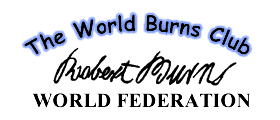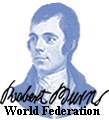


 |
 |
 |
|
Submitted
by regular contributor: |
|
The whisky
industry in Scotland as we know it today has its roots in two defining
sets of changes to the Excise laws. The first of these two sets was implemented
in the 1780s, in an attempt to encourage legal distilling and to simplify
duties and regulations. Robert Burns, Scotland's greatest bard whose name
is intricately linked with whisky, was in the prime of his life and poetically
fully active when this first set of changes took place. It was inevitable
he would react in some way ..... The Wash Act of 1784 lowered duties in England and the Scottish Lowlands. The fermented wash was now taxed in contrast to the Highlands, where the tax was on still capacity. The 'Highland Line' was drawn and whisky was not allowed to be moved across the line. Part of the Wash Act was the withdrawal from the Ferintosh distillery of the privilege to distil free of duty. Burns reacted to this in his poem "Scotch Drink", composed in the winter of 1785/6; his outcry Thee, Ferintosh! O sadly lost! is probably his most cited line in whisky literature. The read the full text of the poem, click on "Scotch Drink", Robert Burns' ode to whisky and its fermented sister, ale. A consequence of the Wash Act was an enormous increase of legal production in the Lowlands. A good part of these spirits were exported to England and this caused alarm with the London gin distillers. As a result of their pressure, the Goverment passed the Scotch Distillery Act in 1786. The Act imposed an extra duty on spirits exported to England (while at the same time expanding the tax on still capacity to the whole of Scotland and abandoning the tax on wash). This increase in duty made it much harder for the Scottish distillers to operate in the English market and Burns' reaction wasn't long in waiting. "The Author's Earnest Cry and Prayer" of 1786 was addressed to the 45 Scottish representatives in the House of Commons, imploring them to rise up to the restrictions imposed on the Scottish whisky industry. The final 'battle cry' has been quoted in many whisky books: Freedom an whisky gang thegither / Tak aff your dram!.
The following is full text of Burns' open letter to William Pitt the Younger, published in the Edinburgh Evening Courant of February 9, 1789 Sir, While pursy Burgesses croud your gates, sweating under the weight of heavy addresses, permit us, the late Distillers in that part of Great Britain called Scotland, to approach you, not with venal approbation but with fraternal condolence; not as what you just now are, or for some time have been, but as what in all probability you will shortly be. - We will have the merit of countenancing not deserting our friend in the day of their calamity, and you will have the satisfaction of perusing at least one honest Address. - You are well acquainted, Sir, with the dissection of Human Nature; nor do you need the assistance of a fellow-creature's bosom to inform you, that Man is always a selfish, often a perfidious being. - This assertion, however the hasty conclusions of superficial observation may doubt of it, or the raw inexperience of youth may deny it, those who make the fatal experiment that we have done, will feel it. - You are a Statesman, and consequently are not ignorant of the traffic of these Corporation-compliments. - The little Great-man who drives the Borough to market, and the very Great-man who buys the Borough in that market, they, two, do the whole business, and you well know, that they, likewise, have their pirce. - With that sullen disdain which you can so well assume, rise, illustrious Sir, and spurn these hireling efforts of venal Stupidity! - At best, they are the compliments of a wretch's friends in the morning of his execution: they take a decent farewell; resign him to his fate; and hurry away from his approaching hour. - If fame say true, and omens be not very much mistaken, you are about to make your exit from that world where the sun of gladness guilds the paths of properous men: permit us, great Sir, with the sympathy of fellow-feeling, to hail your passage to the realms of ruin. - Whether the sentiment proceed from the selfishness or cowardice of mankind, is immaterial; but to a child of misfortune, pointing him out to those who are still more unhappy, is giving him some degree of positive enjoyment. - In this light, Sir, our downfall may be again useful to you: though not exactly in the same way, it is not perhaps the first time that it has gratified your feelings. - It is true, the triumph of your evil star has been exceedingly despiteful. - At an age when other men are the votaries of pleasure, or underlings in business, you had attained a British Statesman's highest wish' and with the ordinary date of human life, what a prospect was before you! - Deeply rooted in Royal Favor, you overshadowed the land: the birds of passage; which follow ministerial sunshine through every clime of political faith and manners, flocked to your branches; and the beast of the field, the lordly Possessors of hills and vallies, crowded under your shade. - "But behold a watcher, a holy one came down from Heaven, and cried aloud, and said this: hew down the tree and, cut off his branches, shake off his leaves, and scatter his fruit: let the beasts get away from under it and the fowls from his branches!" - A blow from an unthought of quarter, one of those terrible accidents which peculiarly mark the hand of Omnipotence, overset your career, and laid all you fancied honours in the dust. - But turn your eyes, Sir, to the tragic scene of our fate. - An ancient nation that for many ages had gallantly maintained the unequal struggle for independence with her much more powerful neighbour, at last agrees to a union which should ever after make them one people. - In consideration of certain circumstances, it was solemnly convenanted, that the Former should always enjoy a stipulated alleviation in her share of the public burdens, particularly in that branch of the revenue known by the name of, the Excise. - This just priviledge had of late given great umbrage to some invidious powerful individuals of the more potent half of the Empire, and they have spared no wicked pains, under insidious pretexts to subvert, what they yet too much dreaded the spirit of their ancient enemies, openly to attack. - By this conspiracy we fell; nor did we alone suffer, our Country was deeply wounded. - A number of, we will say it, respectable characters, largely engaged in trade where we were not only useful but absolutely necessary to our Country, in her dearest interest; we, with all that was near and dear to us, were sacrificed, without remorse, to the infernal deity of Political Expediency! - Not that sound policy, the good of the whole; we fell victims to the wishes of dark Envy and unprincipled Ambition. - Your foes, Sir, were avowed; they were too brave to take an ungenerous advantage; your defeat was in the face of day. - Our enemies, to compleat our overthrow, contrived to make their private treachery the villainy of a Nation: not content with their own guilt they made the Public infamous! Your downfall only drags with you, your friends and partisans; in our misery are more or less involved the most numerous and most useful part of the Community, all those who immediately depend on the cultivation of the soil, from the landlord of a Province down to his lowest hind. - Allow us, Sir, yet farther, just to hint at another rich vein of comfort in the dreary regions of Adversity; - the gratulations of an approving conscience. - In a certain great Assembly of which you are a distinguished member, panegyrics on your private virtues have so often wounded your delicacy, that we shall not distress you with any thing on the subject. - There is, however, one part of your public conduct which our feelings will not permit us to pass in silence - our gratitude must trespass on your modesty - we mean, worthy Sir, the whole of your behaviour to the Scots Distillers. - In evil hours, when obtrusive memory presses bitterly on the sense, let that recollection come, Sir, like a healing angel, and speak the peace to your soul which the world can neither give nor take away. - We have
the honour to be, Sir Article
contributed by Alex Kraaijeveld |